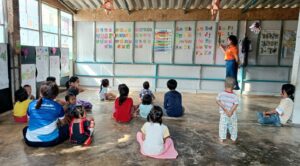APCYF: The Association for Promotion of Children and Youth and Family

APCYF is a Non- Governmental organization in Thailand, For more than 10 years APCYF operates a ”Preschool Preparation Center” which provides education to marginalized boys. Descendants of migrant workers in Mae Kha and Mon Pin subdistricts There are 120 students aged between 1.8 and 3 years old, and most of the children who come to the center do not have ID documents and therefore cannot attend the public children’s center. Parents are migrant workers in poverty, during the daytime, children have to follow their parents working in orange groves, exposed to chemical risks and are not developed to prepare them for entering school.
Fang district, is divided into eight sub-districts, situated at the Thai-Myanmar border in Chiang Mai Province, Thailand. Main economic agricultural crops from Fang are onion, lychee and orange and the vast plantations require many workers, and the employers want to have cheap laborers. This is attracting migrants to cross the border from Shan State of Myanmar, both legally and illegally, seeking work while getting away from the state’s economic and political situation. The Shan State’s economic situation has been deteriorating for the past 15 years caused by the long-term civil war, the effects from Covid-19; and Myanmar’s current coup d’état which has led to conflicts between different factions and worsened the economic possibilities as well as increasing the risk of violence.
Fang’s populations include Thais, registered migrant workers, and people without legal status. Estimate is that the total number of migrants in Fang District is more than twice the number of Thais.
50% of migrant workers are working illegally without a work permit, the migrant workers do not have any rights and are not able to access any social welfare services provided by the Thai government. Many migrants are unable to communicate in Thai and are therefore unable to access any information or argue for their cause, also aggravating the situation.
This situation directly affects the accompanying children who also misses out on rights and services leading to children’s rights being violated as follows:
- The need for labor in the orange orchards is fluctuating, causing non-continuous work for migrant workers. The situation creates economic pressure on families of migrant workers leading to problems including alcohol drinking, domestic violence, divorce, as well as child abuse.
- In the cases of parents divorcing and remarried to new partners, children, especially girls living with their mothers, are at risk of being abused, both sexually and physically. There are several examples of this in both the villages and orchards where APCYF work and surrounding areas with both Thai and migrant populations.
- After working hard every day, male migrant workers would normally drink alcohol believing that it will help to restore energy, as well as helping to clean out the chemicals contaminated in their bodies from spraying pesticides in the orchards. This is further contributing to domestic violence where mostly women and children are physically abused.
- Fact finding and problem analysis among the project’s youth groups in the target areas before Project Phase 1 found that: male youth workers often drink alcohol after work because there was nothing to do; some female youths were raped by their own fathers; early marriage among youths of 15-16 years old.
- Regarding access to children’s health care (child health insurance), children of migrant workers cannot in many cases access health services, even if they have an ID card and are registered at a school.
- A majority of migrant workers are illegal immigrants; hence they are excluded from participation in decisions affecting them and they are without opportunity and space to be able to claim and protect their rights.
The project that APCYF is implementing in partnership with IOGT-NTO Movement aims to establish and maintain safe and appropriate environment for targeted children to grow up, starting from family level up to community level. In Addition, the project is also working on engaging established sub-district level child protection mechanism, systems and networks to build sustainable inclusive functions for the protection of children.
To know more about APCYF work. click here

